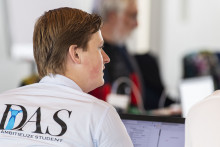The University of Twente is rapidly becoming an international university with 39% international students and a majority of study programmes have shifted to English as the language of instruction. Moreover, the language policy of the university has also switched to English as the primary language. Although the university is fostering an international environment on campus and working to achieve its goals of educating students to be global citizens, the shift in companies and the region of Twente is not that rapid.
Unfortunately, international students struggle to settle in the Netherlands after their graduation (25% students stay after graduation, source: Nuffic) and mention that low proficiency in Dutch language acts as a barrier. Even though proficiency in Dutch is not required on campus, it is quite significant in the region and especially in the job market. Hence, the region is losing talent and low proficiency in language is causing a ‘brain drain’. The Minister of Education has also highlighted these concerns and there is a growing desire to incorporate Dutch in the curriculum to facilitate international students for a future in the Netherlands (source: U-Today).
The University of Twente offers multiple opportunities to students to learn Dutch through the services of the Language Centre. International students are very appreciative of the quality of staff, frequency of language courses and cost of each course. However, many students are unable to make the most of these services and are unable to complete the courses and speak Dutch proficiently. Students mention that they find it very challenging to learn Dutch while following a full-time study. First year students remarked that they face a lot of pressure to meet their MoMi and BSA requirements, and even though they wish to learn Dutch, it is very hard for them to learn Dutch with the stress and study pressure and eventually choose to prioritize their study. The student wellbeing report also highlighted that students that attempt to learn Dutch while following a full time study are at a higher risk of a breakdown.
Allowing students the opportunity to learn Dutch (optionally) will increase their understanding of the language, form a connection with the region, integrate better in society, increase chances of securing a job and a future in The Netherlands – contributing positively to Dutch economy. Additionally, it is beneficial for Dutch students because it establishes lower thresholds in communication, instigating better integration of internationals and leading to better preparation for an international field of employment which is an improvement for every student.
Hence, the aim of UReka is to give explicit attention to ‘prepare students for a successful future in the Netherlands after graduation’. Through our consultation with the International Committee organisation of Study Associations (ICOS), we concluded that special attention must be given to Dutch corporate culture and language. Additional subjects such as intercultural communication may also be beneficial for students. Through extensive consultation with the international student community, we drafted a list of boundary conditions that would ensure international students make the most of the services the UT offers:
- The content must address (at least) Dutch corporate culture and language.
- Provide opportunities to learn Dutch while students are not studying full time.
- Provide opportunities to learn Dutch during a nominal study period.
- Education should either be offered in Enschede or compensation should be provided for travel/housing costs as travel costs are high for international students.
- Learning Dutch must remain optional for international students.
Based on the boundary conditions, UReka proposes to design a minor focusing on Dutch corporate culture and language. There are two possible scenarios for this:
First, design a coherent module of 15 EC with 8 EC focussing on Dutch corporate culture (courses from an existing minor “Professional Learning in Organizations” may be used) and 7 EC focusing on language courses organised by the UT language centre.
Second, develop/extend strategic partnerships with other Dutch universities and jointly offer this minor. The UT-VU collaboration may be extended or a new partnership with Utrecht/Leiden could be formed. It is imperative that teachers are imported, and lectures are given at UT campus as the travel costs would not attract international students to enroll in this minor.
Through this platform, we reach out to the UT community to work with us, provide feedback on our proposal, share ideas so together we can fix the problem. We are open to discuss alternative, broader solutions, however it is imperative that they pertain to the boundary conditions addressed.
On behalf of UReka,
Muhammad Hamza Riaz
Chair of Strategy and Internationalization Committee, University Council







